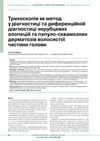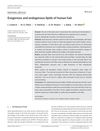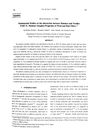2 citations,
December 2020 in “Frontiers in genetics” Researchers found genes linked to feather growth speed in Shouguang chickens, highlighting two genes that might explain differences in feathering.
 1 citations,
November 2020 in “Research Square (Research Square)”
1 citations,
November 2020 in “Research Square (Research Square)” The study found specific skin cells and genes that may affect the quality of cashmere in Liaoning Cashmere Goats.
July 2024 in “Vestnik dermatologii i venerologii” Post-COVID-19 hair loss is different from androgenetic alopecia and can be identified by lower copper and higher selenium levels.
 December 2019 in “Дерматологія та венерологія”
December 2019 in “Дерматологія та венерологія” Trichoscopy is a useful tool for diagnosing hair and scalp disorders.
 14 citations,
February 2017 in “Anais brasileiros de dermatologia/Anais Brasileiros de Dermatologia”
14 citations,
February 2017 in “Anais brasileiros de dermatologia/Anais Brasileiros de Dermatologia” Trichotillomania is often misdiagnosed as alopecia areata and can be treated effectively with N-acetylcysteine and psychotropic drugs.
 1 citations,
September 2011 in “UHOD : Uluslararası hematoloji - onkoloji dergisi”
1 citations,
September 2011 in “UHOD : Uluslararası hematoloji - onkoloji dergisi” Looking at tissue characteristics isn't reliable for telling apart basal cell carcinoma from certain benign skin tumors.
 21 citations,
November 2017 in “Scientific Reports”
21 citations,
November 2017 in “Scientific Reports” Different human hair follicle stem cells grow at different rates and respond differently to a baldness-related compound.
 15 citations,
July 2019 in “Journal of Investigative Dermatology”
15 citations,
July 2019 in “Journal of Investigative Dermatology” CBD can either reduce inflammation and not affect hair growth at low levels or inhibit hair growth at high levels.
 2 citations,
August 2019 in “BMC Complementary and Alternative Medicine”
2 citations,
August 2019 in “BMC Complementary and Alternative Medicine” Asiasari radix extract may be a potential treatment for melanoma because it selectively triggers cell death in melanoma cells by affecting p53 regulation.
February 2023 in “European biophysics journal” November 2022 in “International journal of trichology” Glyoxylic acid straighteners cause more protein loss but have similar hair strength effects as traditional alkaline straighteners.
September 2017 in “The journal of investigative dermatology/Journal of investigative dermatology” Different types of human skin cells respond uniquely to various colors and doses of light, which could lead to specialized light treatments for skin conditions.
 19 citations,
August 2014 in “Journal of Ethnopharmacology”
19 citations,
August 2014 in “Journal of Ethnopharmacology” The study created a test that found hormonal and toxic effects in plant and fungal extracts using prostate cancer cells.
 1 citations,
September 2022
1 citations,
September 2022 Distinguishing drug-induced lupus from systemic lupus is challenging and requires careful monitoring.
 September 2023 in “Journal of Nutrition and Metabolism”
September 2023 in “Journal of Nutrition and Metabolism” One Ashwagandha extract may help protect cells with its antioxidant properties, while another could promote hair growth.
 February 2020 in “Scholars academic journal of pharmacy”
February 2020 in “Scholars academic journal of pharmacy” The weight loss drug Orlistat can cause liver damage and should be used with caution, especially in those with liver or kidney issues.
 211 citations,
February 2009 in “European journal of pharmaceutics and biopharmaceutics”
211 citations,
February 2009 in “European journal of pharmaceutics and biopharmaceutics” Hair follicles help absorb and store topical compounds, aiding targeted drug delivery.
142 citations,
January 2010 in “Journal of dermatological science” Hair follicles are promising targets for delivering drugs effectively.
 75 citations,
June 1999 in “Pediatric Clinics of North America”
75 citations,
June 1999 in “Pediatric Clinics of North America” The document concludes that early recognition and treatment of PCOS in adolescents is crucial for managing symptoms and long-term health risks.
 49 citations,
September 2012 in “The Journal of clinical endocrinology and metabolism/Journal of clinical endocrinology & metabolism”
49 citations,
September 2012 in “The Journal of clinical endocrinology and metabolism/Journal of clinical endocrinology & metabolism” The document concludes with guidance for doctors on diagnosing and treating hirsutism effectively and safely.
 48 citations,
May 2008 in “Drug Discovery Today: Disease Mechanisms”
48 citations,
May 2008 in “Drug Discovery Today: Disease Mechanisms” Hair follicles offer promising targets for delivering drugs to treat hair and skin conditions.
 34 citations,
July 2010 in “Expert Opinion on Drug Delivery”
34 citations,
July 2010 in “Expert Opinion on Drug Delivery” The document concludes that there is no agreed-upon best method for measuring drug delivery within hair follicles and more research is needed to validate current techniques.
 21 citations,
March 2017 in “Skin research and technology”
21 citations,
March 2017 in “Skin research and technology” Removing external lipids from hair reduces moisture and increases strength, while removing internal lipids decreases water permeability.
 21 citations,
May 2008 in “Talanta”
21 citations,
May 2008 in “Talanta” New, cheaper method measures finasteride in tablets accurately and quickly.
13 citations,
January 2002 in “Biochemical and biophysical research communications” Interferon β from hair cells stops the growth of other hair cells.
 9 citations,
January 2017 in “Annals of Dermatology”
9 citations,
January 2017 in “Annals of Dermatology” The study found genetic differences related to hair development that may explain hair loss in a patient with Trichorhinophalangeal syndrome type I.
 9 citations,
January 1989 in “Sen'i Gakkaishi”
9 citations,
January 1989 in “Sen'i Gakkaishi” Wool and hair fibers absorb moisture similarly due to their keratin structure, with the amount of non-crystalline areas affecting the moisture uptake.
8 citations,
January 2017 in “Acta Dermato Venereologica” Thorough clinical examination is crucial for diagnosing unusual alopecia.
6 citations,
January 2007 in “Journal of cutaneous medicine and surgery” The article concludes that careful examination is crucial for the timely diagnosis and treatment of a rare scalp condition in an Aboriginal Canadian teenager.
 5 citations,
October 2014 in “Gynecological Endocrinology”
5 citations,
October 2014 in “Gynecological Endocrinology” Triptorelin helps evaluate hormone production in Sertoli-Leydig cell tumors.




















